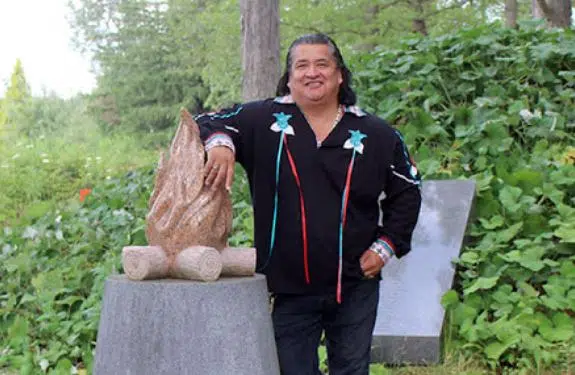Wednesday, June 30th is ‘A Day to Listen’ on radio stations across Canada.
We’re taking the day to amplify local Indigenous voices. FM 101 Milton spoke with the Chief of the Mississaugas of the Credit First Nation, R. Stacey Laforme. He says he’s thankful of the people who have mourned over the last few weeks, but more needs to be done.
Audio PlayerHe adds that all Canadians are getting an idea of the history that Indigenous people in this country have been dealing with. Laforme wants more to be done towards reconciliation.
He happens to be a poet, and reconciliation is the name of a poem he wrote recently. It covers the discovery of the 215 bodies of children at a Kamloops residential school. Like many of the Chief’s poems, ‘Reconciliation‘ was posted to Facebook where it eventually found its way to musician David Hearn. Hearn asked Laforme if he could add music to the reading and it has since been posted to YouTube.
The Chief says the last few weeks have been educational for a lot of Canadians who were kept in the dark about our country’s past.
Audio PlayerHe’s angry. Laforme knows a lot of people are angry alongside him, and he hopes the energy can be converted to improving Canada.
A lot of talk from residents in the country has been around “cancelling” Canada Day. Laforme wrote an introduction for the City of Mississauga’s Canada Day celebration. He then went back to the City and asked them not to play the introduction, but instead play a poem he had just finished writing, titled ‘What if’. In the poem, Laforme addresses the possibility of cancelling Canada Day and he shares his thoughts on paying respects and mourning for the lives lost at residential schools.
Audio PlayerHe feels that a big aspect of moving forward and improving reconciliation will be education. Educating Canadians on the history of our country that has been buried in the shadows. As Laforme says, “we can’t build on sand, and the truth is our foundation.” The next step, he adds, is demanding accountability.
Audio Player215 bodies of children were found at an unmarked gravesite at a residential school in Kamloops, British Columbia. 751 bodies were found at an unmarked gravesite at a residential school in Saskatchewan. Many more residential school properties are being searched at this moment. It’s a tragedy that is opening the eyes of many Canadians to the horrors of the residential school system that had been ongoing for over 100 years.
So now, we listen. We listen to Indigenous leaders, teachers, musicians, and residential school survivors. Hear their stories; feel their pain. We know that there are thousands of children who will never have the chance to tell their story because their lives were destroyed by a hateful system.
215 children in Kamloops. 751 in Saskatchewan. Each one had a name. Each one had a mother and a father. Each one had dreams. Each one deserved better.
Today, we listen. As we should every day.








